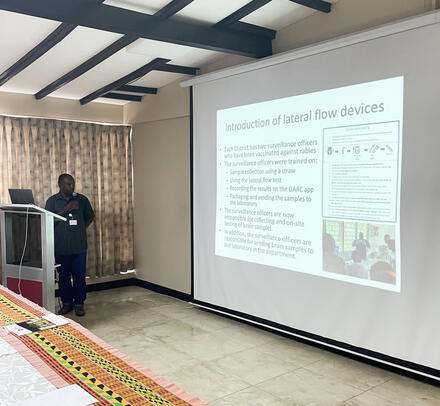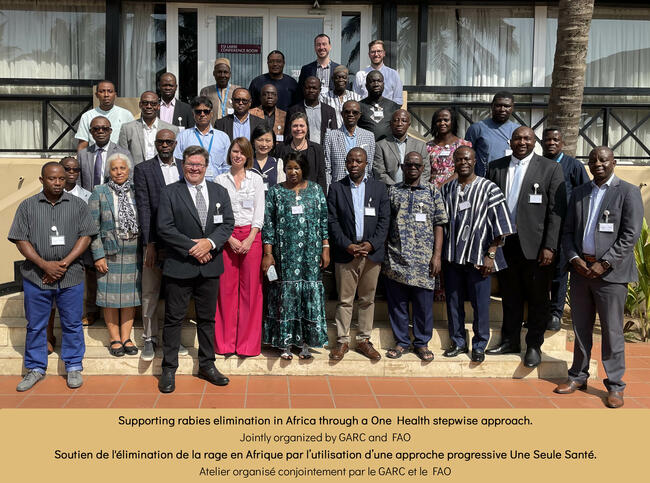PARACON 2023: enabling governments to eliminate rabies with the help of data.
Fourteen delegates – representing 9 Sub-Saharan African countries that undertook in-country Stepwise Approach towards Rabies Elimination (SARE) workshops since 2018 – attended the recent Pan-African Rabies Control Network (PARACON) workshop in Ghana in March 2023. The PARACON workshop, jointly organized by GARC and the Food and Agriculture Organization of the United Nations (FAO), was used to introduce the government-nominated country representatives to tools and resources that can help them implement their rabies elimination work plans.
To introduce the tools and resources in a relatable manner, the workshop was a hands-on event with participants actively taking part in case scenarios and discussion sessions. This meant that participants spent two and a half days actively testing and using the GARC surveillance tools in new and engaging ways. For example, the hands-on session on vaccination tracking was made more engaging and memorable as participants roamed the hotel premises looking for ‘animals to vaccinate’. To do this, posters with pictures of animals and the animal information were placed around the hotel premises and participants were asked to walk around while capturing the ‘vaccination’ data on the mobile phone app. Interactive sessions like this meant that participants got to stretch their legs and enjoy the sunshine while learning how easily the GARC surveillance tools can be used in a practical manner.

More importantly, delegates who were experienced with the surveillance tools facilitated the groups and helped other delegates to learn and understand how to effectively use the tools. After the hands-on sessions, the delegates experienced in the use of the tools had the opportunity to present on their own experiences and highlighted the benefits that using the surveillance tools in their own unique situations provided. This meant that the other delegates could learn about the practical implementation of the tools that GARC offered from fellow rabies experts from the region.

In addition to the hands-on workshop sessions for the GARC surveillance tools, key common questions were addressed in the workshop – for example, what is the role of the rabies rapid test kits? These and other key questions were answered in sessions focusing on the RAIDER protocol to effectively use the rapid test kits in a scientifically sound manner to help improve field surveillance and reporting. Following this, a delegate-led group discussion session focused on identifying and detailing all the steps that form part of a comprehensive Integrated Bite Case Management (IBCM) program.
Lastly, the GARC Education Platform was presented to delegates, and – as was the case throughout this workshop – the information came directly from other delegates who had already implemented the courses in their own countries. More specifically, the delegates from Cote d’Ivoire gave their personal experiences and views on the benefits of the GEP courses for educating and sensitizing the community as well as training professionals.
Going forward, GARC and FAO will continue to work with the governments of the countries that participated in the workshop (and any other interested partners and stakeholders) to implement the tools and resources that were introduced during the workshop. The experiences and positive feedback received from the workshop delegates will encourage us to better engage with other countries and in other regional rabies control networks in the future, taking learning experiences from the benefits of interactive, hands-on exercises and continuing the viewpoint that experts from the countries should be the people who lead by example and showcase the benefits of the implementation of different tools and resources to their fellow experts in the region.

Article contributed by Dr Andre Coetzer (GARC)